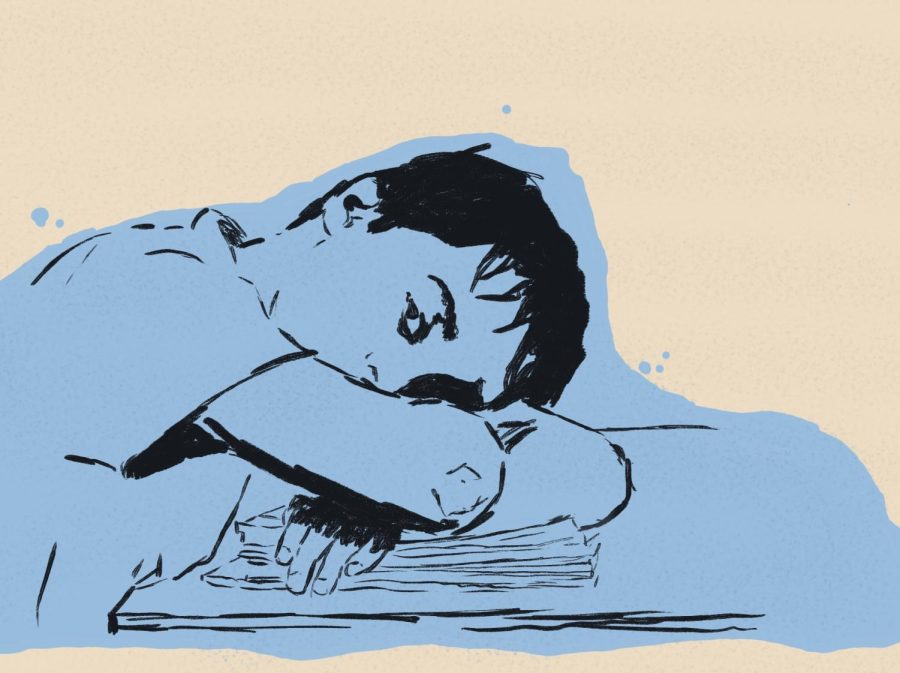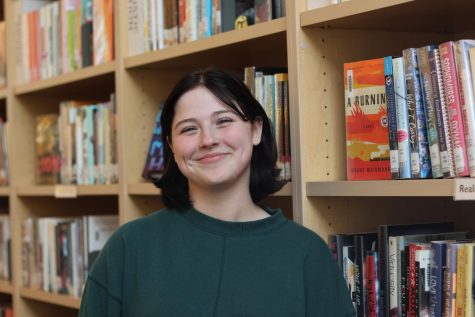“It Is an Issue That Is Growing”: La Salle Talks Mental Health
Following the pandemic and worldwide adjustments made to schooling and students’ lives, the topic of mental health and the struggles that students are facing remains prevalent.
May 24, 2023
In his 2021 Youth Mental Health Advisory, the Surgeon General said that “the challenges today’s generation of young people face are unprecedented and uniquely hard to navigate. And the effect these challenges have had on their mental health is devastating.”
At La Salle, many staff and students have expressed a similar sentiment.
“It’s definitely something that impacts La Salle, I think across all ages, genders, everything,” counselor Mr. Kevin Doyle said. “I think almost every grade and every student I’ve worked with has had some sort of impact on their mental health, whether they’re known and recognized or whether it’s something that they’re coming to terms with.”
Aside from counselors, some teachers also noted the continued challenges surrounding mental health at La Salle.
“I can’t necessarily speak on how great it is, but I can say that I feel, based on what I have in my classroom, that it is an issue that is growing,” religious studies teacher Ms. Jane Nitschke said.
While the problem is evident, it’s hard to tell if the prevalence of teen mental health issues is a product of their worsening or of a more welcoming environment for conversations about them.
“[At a previous school,] I don’t remember talking about it explicitly at that time, anywhere near as much as we do now, and I actually think that that’s progress,” religious studies teacher Mr. Tom McLaughlin said. “I think the fact that we are talking about it now is normalizing what’s always been there. And so I think at some level, it’s going to seem like it’s worse and ‘Oh my gosh, things are getting so bad,’ and I don’t think that’s true. I think what’s true is we have space and permission and perhaps boldness to talk about it.”
Nevertheless, the pervasive effect of the COVID-19 pandemic, and the lockdown that accompanied it, on teenage mental health is recognized by many within the La Salle community.
“I’ve been teaching for 20-plus years, and I just really feel like, coming out of the pandemic, I see a lot more students with anxiety,” Director of STEAM and Innovation and Design teacher Ms. Carie Coleman said.
With such widespread and significant effects on education and socialization nationwide, struggles when coming back to in-person classes are seen as inevitable by some.
“It seems to me like, if you spend two years hunkered down in your house with disrupted social routines, that getting back to school, or life in general, you can’t help but have there be some challenges,” Vice Principal for Student Life Mr. Aaron Hollingshead said.
In addition to the pandemic, members of the community see the problem as a partial result of what some may describe as a sometimes unforgiving academic culture at La Salle.
“Some teachers don’t really acknowledge that a lot of students play multiple sports and [that] they have a lot on their plate, dealing with personal issues and homework and tests and studying and then friends,” junior Gabby Matic said. “And I feel like they sometimes forget how much it is to balance on someone’s plate and how it’s a big impact on someone’s life.”
Aside from students, even some educators identify difficult classes as a detriment to students’ well-being.
“I also feel like school should be somewhat fun,” science teacher Mr. Eric Roth said. “It shouldn’t be all nose to the grindstone … And I think sometimes we lose sight of that.”
Mr. Doyle, in his work as a counselor, said that he has noticed that the source of academic stress can sometimes extend even further than a teacher’s control.
“I see the pressure that’s put on students here, both by themselves and family and friends and teachers and so many stakeholders, and not that it’s not warranted, I think it’s good to have high expectations, but there’s just a lot of emphasis on success and doing well,” Mr. Doyle said. “And so I think I see it as definitely a big thing that our students are struggling with.”
Rather than a health crisis or relentless school work, others such as Mr. Roth, partially attribute worsening teenage mental health to America’s current divisive political climate.
When surveyed by the nonpartisan Pew Research Center, Americans were the most likely to say their society was split along partisan, racial, and ethnic lines out of respondents from 17 different countries in Europe, Asia, and North America. Junior Evelyn Barrera notices a potential result of this divide.
“No one has empathy and care for others, and I feel like that really affects people, and that makes people sort of stop socializing and wanting to connect with people, which causes their mental health to get even worse,” Barrera said.
Just as opinions on the root of the problem differ, there is great variety in students’ chosen coping strategies. Despite La Salle offering various support methods through counseling and programs like Appa, many students look for support outside of La Salle.
Although she herself speaks to her school counselor roughly once a month, Barrera feels other students have “a fear of [school] counselors,” and thus look for mental health help elsewhere. For instance, seniors Thomas Olson and Jonathan Barnes have elected to work with therapists instead.
“I have a therapist that I haven’t been seeing that regularly, but I recommend people go to therapy,” Barnes said.
Other La Salle students feel more comfortable looking to teachers for support.
“I’ll have students who just come in and just want to talk,” Ms. Nitschke said. “They just want to talk about whatever is on their head. I’ll have some students come in who are seriously having anxiety issues that make it challenging for them to function at that period, and then that’s a case of then working with counseling and getting to make sure that they can get into a counselor. If it gets to a point where this is beyond just me listening, then it’s like, ‘Okay, well, let’s walk down to see the counselor.’”
Art teacher Ms. Cha Asokan feels that there is something about how a teacher conducts their class and themselves in front of students that determines if a student feels comfortable.
“There is something to what you’re bringing as the educator into the environment about how you’re responding to kids and if they can trust you, then that environment just kind of starts to grow,” Ms. Cha said. “Really, we’re just people that are in an environment that are trying to help each other or support each other.”
Despite a very different curriculum, Mr. Roth employs some of the same ideas as Ms. Cha when conducting his classes.
“I try to make students feel comfortable, I try to be there for them and listen to them, and I try to make time for students,” Mr. Roth said. “I try to make them feel at ease with me because I think that having that trust opens up a lot of avenues — avenues to teach and be a good educator, but also avenues to have relationships.”
Mr. Roth also noted strategies unique to him that could still be employed by other teachers in their own way. Specifically, Mr. Roth identified playing hacky-sack with students as a way to put himself “more at their level” and encourage them to be “more socially open,” he said.
Even if all teachers were able to adapt to classroom environments, not everyone believes that would be enough to deal with La Salle students’ mental health struggles.
“I feel like it’s not that simple of a thing to address,” Barnes said. “A solution would come with larger steps.”
While there’s no definite answer, Mr. Doyle feels like an increased sense of agency felt by students in their own lives could prove helpful.
“I would love for students to start to feel like they have more control over what they want to do in their future,” Mr. Doyle said. “I think it’s hard when there are a lot of stakeholders in a student’s life. And not to say that those people need to back off or not care but to … recognize that and then have students have a little more control and a little more understanding of what they actually want to do and how they need to take care of themselves for the long term.”
Olson and Matic are in agreement that the first step to solving mental health issues at La Salle is talking about them, a topic that has moved closer to the forefront, but not as close as it should be in their opinion.
“I feel like they say it’s a big deal but then kind of just brush it off, and people don’t really go into detail about it,” Matic said.
Despite there being a multitude of suggested solutions, many see the first step in tackling the rise in mental health struggles among students to be fully acknowledging that it exists.
“The more we talk and the less stigma that’s around it, the better,” Ms. Cha said.







